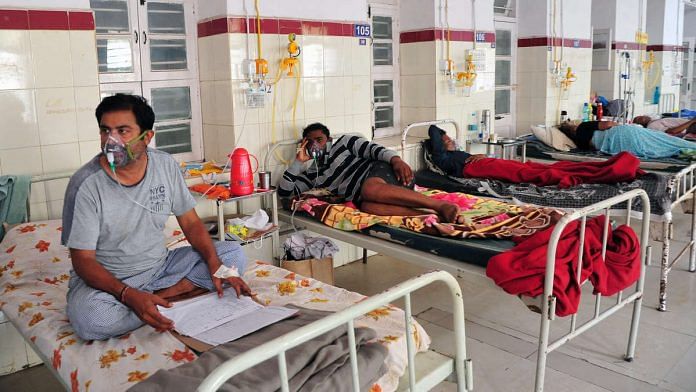Bengaluru: Earlier this week, BJP MP Tejasvi Surya, who had alleged there was a “rampant” bribe-for-bed scam in Bengaluru, claimed he had found a way to make the system loophole-free through technological intervention, and would get the city’s municipal body to implement it within 100 hours.
However, senior officials of the Bruhat Bengaluru Mahanagara Palike (BBMP) as well as health experts have criticised Surya’s Monday announcement, saying the existing system of bed allotment during the Covid-19 pandemic has been elaborately planned to suit the demands of patients, though they didn’t reject all the reforms he had suggested.
After several marathon meetings and discussion with tech stalwarts like Nandan Nilekani, Surya announced that he was ready to “change the system”.
What's coming up in the next 100 hours in the BBMP bed allocation system?
A digital queuing system indicating the position of a patient requesting a bed in the queue for hospitalization.
We've also requested for more efficient discharge updation from the hospitals. pic.twitter.com/O8Co5vMeQq
— Tejasvi Surya (@Tejasvi_Surya) May 11, 2021
But many of the measures that the Bengaluru South MP claimed had been implemented were found to have reverted to their original form by Tuesday, as they were seen to be contrary to ground realities.
Also read: Tejasvi Surya ‘communalises’ Covid fight by accusing Muslim volunteers of beds allotment racket
The four ‘fixes’
Addressing the media Monday, Tejasvi Surya had announced four major reforms to defeat the alleged bribe-for-bed allocation scam.
– A digital queuing system indicating the position of a patient requesting a bed in the queue for hospitalisation.
– An Aadhaar-enabled biometric or OTP-based verification during admission.
– The time period between a bed being blocked and a patient occupying it would be reduced from 10 to four hours to prevent misuse.
– Doing away with manually unblocking beds.
In addition, to ensure accountability, he said the new bed allocation system would record the name of the nodal officer or the doctor who blocks a bed.
“Earlier, a patient’s detail was used as a proxy to block the bed and later allocate it to someone else. It will stop now. There will be complete transparency,” the BJP MP had said.
Why these reforms can’t be implemented
BBMP officials and civic health experts explained why most of these reforms were unimplementable.
The queue and token system, in particular, has received severe criticism. Under this system, Surya had said each bed type — high dependency, intensive care etc. — would have a separate queue based on the patient’s requirement. If the health of the patient deteriorates, he/she would be shifted to the priority queue, he had said.
However, a senior BBMP official told ThePrint on the condition of anonymity that a strict queue system run by a machine, and not handled manually at times, could prove detrimental.
“There is a need to assess the allocation, the severity of the health of the patient, and then decide on the status of the patient. If you completely automate it, it could lead to unfortunate incidents and even deaths. A doctor needs to be the one to take a final call on the patient’s health based on oxygen levels, co-morbidities and age,” the official said.
A second BBMP official who did not wish to be identified told ThePrint that the time frame between blocking a bed and the patient getting admitted has been kept at six to seven hours, because it has been observed that that’s how much time the process takes, owing to many factors such as test results, travel time and even getting discharged from another hospital.
“This decision was based on data gathered over the last one and a half years since the pandemic broke out. People usually land up at the hospital for a bed almost six hours after they have made the request. So, bringing down the time to four hours would cause further panic if the patient loses the booking,” said the official.
Another measure announced by Surya was doing away with the manual unblocking of beds. This, the same official said, was also not possible.
A third BBMP official attached to a Covid war room concurred. “The day the reforms were announced, our system required us to unblock 20 beds manually due to medical circumstances. Having a manual option under supervision is always a safe,” this official said.
Also read: Did Tejasvi Surya apologise for ‘communal’ remark? His office says no, BBMP staff say yes
System is broken, but medical experts need to be consulted
Srinivas Alavilli, a well-known civic activist, agreed that any automated system should have the option of a manual override. “Even Boeing has a manual override on its planes,” he said.
However, Alavilli did appreciate the attempts to clear up hurdles in bed allotment. “The system is definitely broken. Bed management should be centralised, while other things can be decentralised,” he said.
“There needs to be an understanding that any kind of reforms within a short period of time could cause more damage. This is a life-and-death issue and not another computer application. Domain experts have put their minds to it. Reforms should be made not just by software experts, but involvement of medical domain experts,” Alavilli added.
(Edited by Shreyas Sharma)
Also read: BBMP reinstates 16 Muslim workers suspended after Tejasvi Surya row, but 5 refuse to return



